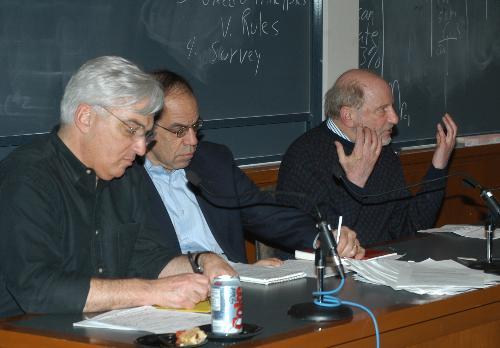
News
Summers Will Not Finish Semester of Teaching as Harvard Investigates Epstein Ties

News
Harvard College Students Report Favoring Divestment from Israel in HUA Survey

News
‘He Should Resign’: Harvard Undergrads Take Hard Line Against Summers Over Epstein Scandal

News
Harvard To Launch New Investigation Into Epstein’s Ties to Summers, Other University Affiliates

News
Harvard Students To Vote on Divestment From Israel in Inaugural HUA Election Survey
HLS Panel Debates Ethics of Torture

Professor of Criminal Justice Richard Parker suggested that torture of national enemies may be ethically justifiable in certain situations in a debate with the director of a national human rights organization at Harvard Law School yesterday evening.
Parker described himself as a skeptic of suggestions that restricted use of torture for information-gaining purposes would lead to greater injustices.
He said he thinks torture of a single enemy to save the lives of several U.S. citizens should be legally justifiable, although it is not currently under U.S. law.
Given the opportunity, he said, he would agree to torture Osama bin Laden with the hope of gaining information about terrorist threats.
But Leonard Rubenstein, the executive director of Physicians for Human Rights, maintained that torture ought to be unconditionally unpermissible.
Passing a federal law permitting torture under any circumstances could initiate a slippery slope of infringement on human rights and the United States’ fundamental ideology, he said.
“Once you allow exceptions, there is no way of stopping it,” Rubenstein said. “Once we depart from the idea that torture is an absolute wrong, what do you think will happen in other countries?”
The small panel, moderated by Law School Professor Henry Steiner, was convened to address the propriety of federal information-seeking tactics in the face of terrorist threats.
Debates over the conditional propriety of torture have intensified over the past few years.
The Washington Post published an article in December alleging that U.S. intelligence forces were associated with prisoner torture on foreign soil. The State Department has denied that any government agencies employ torture to gain information under any circumstances.
Parker, a criminal and constitutional law scholar who served on a committee exploring alleged U.S. involvement in foreign torture, said he felt that exploration of the topic was often mired in unspecific rhetoric.
“Torture talk has a categorical absolutist quality,” he said. “Time and again, people discussing the problem will revert to the word ‘torture.’”
Parker said torture is less brutal than many other possible tactics used during war.
“It’s certainly not as bad as having Napalm dropped on an entire village,” he said.
Protecting the safety of U.S. citizens should be more important than exposing torture victims to “the desperation, deprivation of dignity and loneliness” Parker said they normally suffer.
Rubenstein argued the relative magnitude of injustices should not be considered.
“Getting raped is worse than getting mugged,” he said facetiously. “But getting mugged is still bad.”
He said Parker’s view of torture as simply the stimulation of normal emotions ignores its brutality.
“Torture is off the end of the line,” he said.
Allowing any exceptions to the government’s strict condemnation of torture will contradict the principles of the nation’s legal system, Rubenstein said.
“To say that anything goes in protecting citizens seems to abandon law altogether,” he said.
But Parker questioned the slippery slope of injustice that Rubenstein asserted, suggesting that the government should be able to maintain its self-control.
“Why should we assume that people trying to get information [through torture] will drive on and on and on?” he asked.
—Staff writer Nathan J. Heller can be reached at heller@fas.harvard.edu.
Want to keep up with breaking news? Subscribe to our email newsletter.
